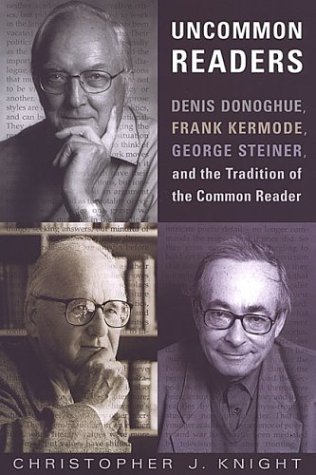

Most ebook files are in PDF format, so you can easily read them using various software such as Foxit Reader or directly on the Google Chrome browser.
Some ebook files are released by publishers in other formats such as .awz, .mobi, .epub, .fb2, etc. You may need to install specific software to read these formats on mobile/PC, such as Calibre.
Please read the tutorial at this link. https://ebooknice.com/page/post?id=faq
We offer FREE conversion to the popular formats you request; however, this may take some time. Therefore, right after payment, please email us, and we will try to provide the service as quickly as possible.
For some exceptional file formats or broken links (if any), please refrain from opening any disputes. Instead, email us first, and we will try to assist within a maximum of 6 hours.
EbookNice Team

Status:
Available4.8
36 reviewsImpressive in scope and erudition, Christopher Knight's Uncommon Readers focuses on three critics whose voices - mixing eloquence with pugnacity - stand out as among the most notable independent critics working during the last half-century. The critics are Denis Donoghue, Frank Kermode, and George Steiner, and their independence - a striking characteristic in a time of corporate criticism - is reflective of both their backgrounds (Donoghue's Catholic upbringing in Protestant-ruled Northern Ireland; Kermode's Manx beginnings; and Steiner's Jewish upbringing in pre-Holocaust Europe) and their temperaments. Each represents a party of one, a fact that has, on the one hand, made them the object of the occasional vituperative dismissal and, on the other, contributed to their influence and remarkable longevity.
Since the 1950s, Steiner, Donoghue, and Kermode have each maintained a highly public profile, regularly contributing to such influential publications as Encounter, New Yorker, New York Review of Books, Times Literary Supplement, and the London Review of Books. This aspect of their work receives particular attention in Uncommon Readers, for it illustrates a renewed interest in the role of the public critic, especially in relation to the genre of the literary-review essay, and signals a sustained conversation with an educated public - namely the common reader.
Knight makes the argument for the review essay as a serious and still viable genre, and he examines the three critics in light of this assumption. He expounds upon the critics' separate interests - Kermode's identification with discussions of canonicity, Steiner's with cultural politics, and Donoghue's with the persistent claims of the imagination - while also revealing the ways in which their work often reflects theological interests. Lastly, he attempts to adjudicate some of the conflicts that have arisen between these critics and other literary theorists (especially the post-structuralists), and to discuss the question of whether it is still possible for critics to work independently. Original and deliberative, Uncommon Readers presents a renewed defense of the tradition of the common reader.